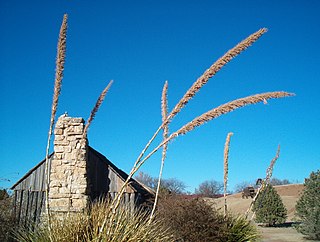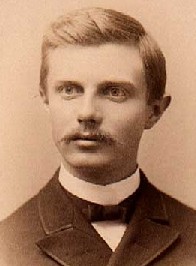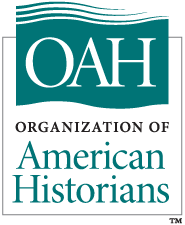Related Research Articles

A frontier is a political and geographical term referring to areas near or beyond a boundary.

Frederick Jackson Turner was an American historian during the early 20th century, based at the University of Wisconsin-Madison until 1910, and then Harvard University. He was known primarily for his frontier thesis. He trained many PhDs who went on to become well-known historians. He promoted interdisciplinary and quantitative methods, often with an emphasis on the Midwestern United States.
The Frontier Thesis, also known as Turner's Thesis or American frontierism, is the argument advanced by historian Frederick Jackson Turner in 1893 that the settlement and colonization of the rugged American frontier was decisive in forming the culture of American democracy and distinguishing it from European nations. He stressed the process of "winning a wilderness" to extend the frontier line further for U.S. colonization, and the impact this had on pioneer culture and character. Turner's text takes the ideas behind Manifest Destiny and uses them to explain how American culture came to be. The features of this unique American culture included democracy, egalitarianism, uninterest in bourgeois or high culture, and an ever-present potential for violence. "American democracy was born of no theorist's dream; it was not carried in the Susan Constant to Virginia, nor in the Mayflower to Plymouth. It came out of the American forest, and it gained new strength each time it touched a new frontier," wrote Turner.

Arthur Meier Schlesinger was an American historian who taught at Harvard University, pioneering social history and urban history. He was a Progressive Era intellectual who stressed material causes and downplayed ideology and values as motivations for historical actors. He was highly influential as a director of PhD dissertations at Harvard for three decades, especially in the fields of social, women's, and immigration history. His son, Arthur M. Schlesinger Jr. (1917–2007), also taught at Harvard and was a noted historian.
The Western History Association (WHA), a 501(c)(3) non-profit organization, was founded in 1961 at Santa Fe, New Mexico by Ray Allen Billington, et al. Included in the field of study are the American West and western Canada. The Western History Association was headquartered from 2012 to 2017 at the University of Alaska, Fairbanks. From 2018 to 2020 the WHA was hosted on the campus of the University of Nebraska at Omaha. In 2020, the WHA relocated to the Department of History at the University of Kansas, where it receives support from the College of Liberal Arts and Sciences.

"The Significance of the Frontier in American History" is a seminal essay by the American historian Frederick Jackson Turner which advanced the Frontier thesis of American history. Turner's thesis had a significant impact on how people in the late 19th and early 20th centuries understood American identity, character, and national growth. It was first presented to a special meeting of the American Historical Association at the World's Columbian Exposition in Chicago, Illinois in 1893, and published later that year first in Proceedings of the State Historical Society of Wisconsin, then in the Annual Report of the American Historical Association. It has been subsequently reprinted and anthologized many times, and was incorporated into Turner's 1920 book, The Frontier in American History, as Chapter I.

The Organization of American Historians (OAH), formerly known as the Mississippi Valley Historical Association, is the largest professional society dedicated to the teaching and study of American history. OAH's members in the U.S. and abroad include college and university professors; historians, students; precollegiate teachers; archivists, museum curators, and other public historians; and a variety of scholars employed in government and the private sector. The OAH publishes the Journal of American History. Among its various programs, OAH conducts an annual conference each spring, and has a robust speaker bureau—the OAH Distinguished Lectureship Program.
Merle Eugene Curti was an American progressive historian who influenced peace studies, intellectual history and social history, including by using cliometrics. At Columbia University and for decades at the University of Wisconsin, Curti directed 86 finished Ph.D. dissertations and had a wide range of correspondents. He was known for his commitment to democracy, as well as the Turnerian thesis that social and economic forces shape American life, thought and character.
The "new western history" movement emerged among professional historians in the 1980s, a belated manifestation of the 1970s "new social history" movement. The new western historians recast the study of American frontier history by focusing on race, class, gender, and environment in the trans-Mississippi West. The movement is best known through the work of Patricia Nelson Limerick, Richard White, William Cronon, and Donald Worster. The philosophy and historiography of the new western historians is discussed thoroughly and supportively in Patricia Nelson Limerick, Clyde Milner II, and Charles E. Rankin, eds., Trails: Toward A New Western History. An overview of the New Western History is available in Clyde Milner, et al., The Oxford History of the American West.
Francis Paul Prucha was an American historian, professor emeritus of history at Marquette University, and specialist in the relationship between the United States and Native Americans. His work, The Great Father: The United States Government and the American Indians, won the Ray Allen Billington Award and was one of the two finalists for the 1985 Pulitzer Prize in History. It is regarded as a classic among professional historians.

Rodman Wilson Paul was an American historian who taught at the California Institute of Technology. He was known primarily as a foremost authority on California mining and agricultural Native American history.
The following works deal with the cultural, political, economic, military, biographical and geologic history of the Midwestern United States.

Richard Joseph Jensen is an American historian and Wikipedia editor. He was a professor of history at the University of Illinois, Chicago, from 1973 to 1996. He has worked on American political, social, military, and economic history as well as historiography and quantitative and computer methods. His work focuses on Midwestern electoral history. He authored The Winning of the Midwest and Historian's Guide to Statistics.
Martin Ridge was an American historian and director of research at the Huntington Library. He is particularly known for the 1982 5th edition of "Westward expansion: a history of the American frontier" co-authored with Ray Allen Billington.
Elliott West is an American historian and author. He studies the history of the American West.
Wilbur R. Jacobs was an American historian, with a special interest in Native American, Western, and Environmental history.
W. Turrentine "Turpie" Jackson was an American professor of history, specializing in Western U.S. history.
Jackson Turner Main (1917–2003) was an American professor, historian and author who researched and wrote about the colonial American social order before, during and after the American Revolution. He was the grandson of Frederick Jackson Turner, author of the influential Frontier Thesis. Main worked most of his adult life as a professor and author of American Revolution history where it involved the social order during that period and wrote seven ground-breaking works in this area.
This is an English language bibliography of scholarly books and articles on the American frontier. It is a selection from tens of thousands of titles. See also: Bibliography of the Western United States
Bibliography of the Western United States is a small selection of the most useful books and articles on the Western United States.
References
- ↑ Billington, Ray Allen (January 1970). "The Frontier and I". Western Historical Quarterly. 1 (1): 4–20. doi:10.2307/967401. JSTOR 967401.
- ↑ Ridge, Martin (January 1988). "Frederick Jackson Turner, Ray Allen Billington, and American Frontier History". Western Historical Quarterly. 19 (1): 4–20. doi:10.2307/969790. JSTOR 969790.
- ↑ Lamar, Howard R. (October 1986). "Much to Celebrate: The Western History Association's Twenty-Fifth Birthday". Western Historical Quarterly. 17 (4): 397–416. doi:10.2307/969016. JSTOR 969016.
- ↑ Ridge, Martin (July 1981). "Ray Allen Billington (1903-1981)". Western Historical Quarterly. 12 (3): 246. doi:10.1093/whq/12.3.244. JSTOR 3556586 – via JSTOR.
- ↑ "Memoirs", Proceedings of the Massachusetts Historical Society, 1981 Richard W. Leopold
- ↑ Gaiter, Dorothy J. (March 8, 1981). "Ray Billington, Chronicler of Nation's Move West". New York Times. Retrieved 29 August 2014.
- ↑ "The Bancroft Prizes: Previous Awards". Columbia University Libraries. Retrieved 29 August 2014.
- ↑ "Ray Allen Billington Prize". Organization of American Historians. Retrieved 29 August 2014.
- ↑ "Billington". Occidental College Department of History. Occidental College. Retrieved 29 August 2014.
- ↑ "Billington Student Research Fellowship". Occidental College Department of History. Occidental College. Retrieved 29 August 2014.